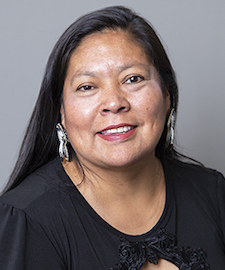Tarissa Spoonhunter
High Plains American Indian Research Institute, Haub School of Environment and Natural Resources
Director - High Plains American Indian Research Institute, Assistant Professor

Education
PhD American Indian Studies, University of Arizona (2014)
MA American Indian Studies, University of Arizona (2001)
BA Social/Cultural Anthropology, University of Montana (1997)
Background and Expertise
As assistant professor in the Haub School of ENR and Director of the High Plains American
Indian Research Institute, Dr. Spoonhunter enrolled Northern Arapaho (descendant of
the Blackfeet Oglala and Dakota tribes) has focused her research on assetting treaty
rights on traditional ceded lands such as Glacier National Park and Badger Two Medicine.
Her teaching focuses on contemporary issues facing tribes as sovereign nations government
to government political relationship in tribal resource management. She has taught
at University of Arizona, Blackfeet Community College, Wind River Tribal College,
Tohono O'Odham community College, and Central Wyoming College to empower tribal students
to utilize the western educational tools to be an asset in their tribal communities
and academic endeavors. The transfer of knowledge is key to her courses in traditional
ecological knowledge, ENR, and Native American Indigenous Studies. Tribal engagement
in her coursework is key to building partnerships with the Wind River Tribal Buffalo
Initiative, and tribal programs managing cultural and natural resources in Wyoming.
Spoonhunter was given the name Medicine Beaver Woman Nato Ksiksstaki Aki (Blackfeet)
at age nine from the central medicine bundle of the Blackfoot Confederacy with responsibility
to her people. This name carried her through her life accomplishments earning a Bachelor
of Arts Degree in Anthropology from the University of Montana, Master of Arts and
Ph. D in American Indian Studies from the University of Arizona. She has earned awards
from Diverse Issues in Higher Education, presented at national Conferences and worked
on grants from the National Science Foundation, Department of Energy, and the WORTH
faculty awards.

